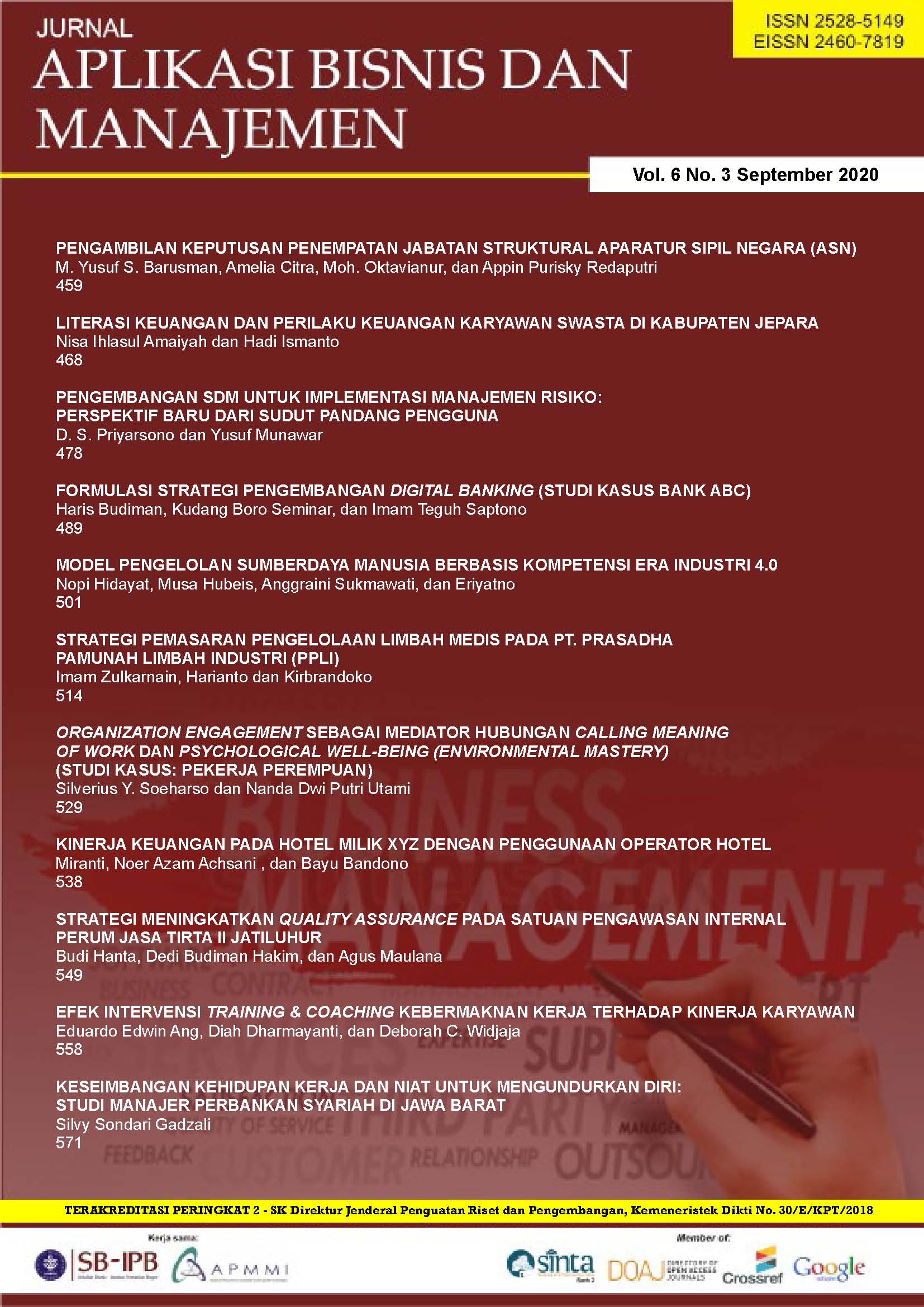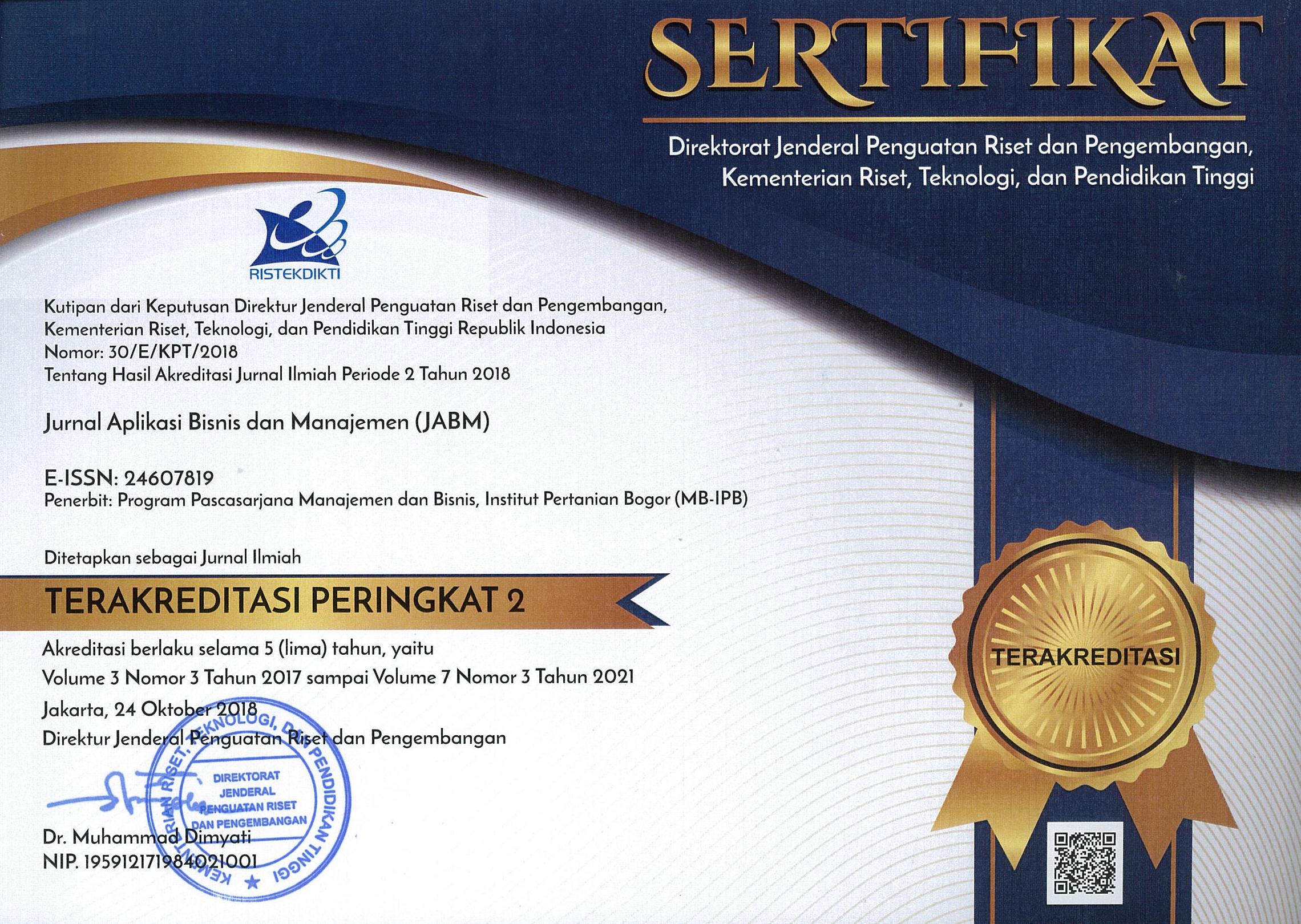LITERASI KEUANGAN DAN PERILAKU KEUANGAN KARYAWAN SWASTA DI KABUPATEN JEPARA
Financial Literacy and Financial Behavior of Private Employees in Jepara Regency
Abstract
Financial behavior is an interesting topic, given the consumptive Indonesian society. This study aims to analyze the relationship of financial literacy and demographic factors in determining the financial behavior of private employees in Jepara Regency. The sampling method uses purposive sampling and data is measured using a Likert scale 1 to 5. Data are analyzed using a quantitative approach including validity and reliability, multiple linear regression analysis, coefficient of determination, F-test, and t-test. The results of this study indicate that age, education level, income, and financial literacy simultaneously determine the financial behavior of private employees, but individually income does not affect financial behavior. High-income private employees need to control behavior in managing finances, reducing consumer spending and managing finances well.
Keywords: multiple linear regression analysis, demographic factors, education, financial behavior, financial literacy
Downloads
References
Aminatuzzahra’. 2014. “Persepsi Pengaruh Pengetahuan Keuangan, Sikap Keuangan, Sosial Demografi Terhadap Perilaku Keuanagn Dalam Pengambilan Keputusan Investasi Individu ( Studi Kasus Pada Mahasiswa Magister Manajemen Universitas Diponegoro ).” Jurnal Bisnis Strategi 23(2): 70–96.
Andrew, Vincentius, and Nanik Linawati. 2014. “Hubungan Faktor Demografi Dan Pengetahuan Keuangan Dengan Perilaku Keuangan Karyawan Swasta Di Surabaya.” Finesta 02(02): 35–39.
Chen, Haiyang, and Ronald P. Volpe. 2002. “Gender Differences in Personal Financial Literacy Among College Students.” Financial Services Review 11(3): 289–307.
Dewi, IGA Mertha, and Ida Bagus Anom Purbawangsa. 2018. “Pengaruh Literasi Keuangan, Pendapatan Serta Masa Bekerja Terhadap Perilaku Keputusan Investasi.” E-Jurnal Ekonomi dan Bisnis Universitas Udayana 7: 1867–94.
Ghozali, Imam. 2013. Aplikasi Analisis Multivariate Dengan Program SPSS 21. 7th ed. Semarang: Badan Penerbit Universitas Diponegoro.
Hogarth, Jeanine M, and Marianne A Hilgert. 2002. “Financial Knowledge, Experience, and Learning Preferences: Preliminary Results from a New Survey on Financial Literacy.” Proceedings of the American Council on Consumer Interests 2002 Annual Conference 48: 1–7. http://www.consumerinterests.org/public/articles/%5Cpublic%5Carticles%5CFinancialLiteracy-02.pdf.
Huston, Sandra J. 2012. “Financial Literacy and The Cost of Borrowing.” International Journal of Consumer Studies 36(5): 566–72.
Lestari, Bunga Ayu, Budi Suharjo, and Istiqlaliyah Muflikhati. 2017. “Minat Kepemilikan Kartu Kredit (Studi Kasus Kota Bogor).” Jurnal Aplikasi Bisnis dan Manajemen 3(1): 143–51.
Nababan, Darman, and Sadalia Isfenti. 2012. “Analisis Personal Financial Literacy Dan Financial Behavior Mahasiswa Strata I Fakultas Ekonomi Universitas Sumatera Utara Darman.” : 1–16.
Perry, Vanessa G., and Marlene D. Morris. 2005. “Who Is in Control? The Role of Self-Perception, Knowledge, and Income in Explaining Consumer Financial Behavior.” Journal of Consumer Affairs 39(2): 299–313.
Purwidianti, Wida, and Rina Mudjiyanti. 2017. “Analisis Pengaruh Pengalaman Keuangan Dan Tingkat Pendapatan Terhadap Perilaku Keuangan Keluarga Di Kecamatan Purwokerto Timur.” Benefit: Jurnal Manajemen dan Bisnis 1(2): 141.
Putri, Ni Made Dwiyana Rasuma, and Henny Rahyuda. 2017. “Pengaruh Tingkat Financial Literacy Dan Faktor Sosiodemografi Terhadap Perilaku Keputusan Investasi Individu.” E-Jurnal Ekonomi dan Bisnis Universitas Udayana 6(9): 3407–34.
Rizkiawati, Nur Laili, and Nadia Asandimitra. 2018. “Pengaruh Demografi, Financial Knowledge, Financial Attitude, Locus of Control Dan Financial Self-Efficacy Terhadap Financial Management Behavior Masyarakat Surabaya.” Ilmu Manajemen 6(2010).
Rustiaria, Annora Paramitha. 2017. “Pengaruh Pengetahuan Keuangan, Sikap Keuangan, Dan Tingkat Pendidikan Terhadap Perilaku Pengelolaan Keuangan Keluarga.” Journal of Business and Banking: 1–17.
Savignac, Frédérique. 2008. “Impact of Financial Constraints on Innovation: What Can Be Learned from a Direct Measure?” Econ. Innov. New Techn. 17(6): 553–69.
Sayinzoga, Aussi, Erwin H. Bulte, and Robert Lensink. 2016. “Financial Literacy and Financial Behaviour: Experimental Evidence from Rural Rwanda.” The Economic Journal 126(594): 1571–99.
Siahaan, Mega Dwi Rani. 2013. “Pengaruh Literasi Keuangan Terhadap Perilaku Pengelolaan Keuangan Pada Mahasiswa Perguruan Tinggi Di Surabaya.” Journal of Business and Banking 1: 1–17.
Susanti, Ari, and Elia Ardyan. 2018. “Tingkat Pendidikan, Literasi Keuangan, Dan Perencanaan Keuangan Terhadap Perilaku Keuangan UMKM Di Surakarta.” Telaah Bisnis 18(1): 45–56.
Susdiani, Laela. 2017. “Pengaruh Financial Literacy Dan Financial Experience Terhadap Perilaku Perencanaan Investasi PNS Di Kota Padang.” Jurnal Pembangunan Nagari 2(1): 61–74.
Wirosari, Taefiequr R, and Zaenal Fanani. 2013. “Pengaruh Umur, Gender, Dan Pendidikan Terhadap Perilaku Risiko Auditor Dalam Kpnteks Audit Atas Laporan Keuangan.”
Xiao, Jing Jian, Sun Young Ahn, Joyce Serido, and Soyeon Shim. 2014. “Earlier Financial Literacy and Later Financial Behavior of College Students.” International Journal of Consumer Studies 38(6): 593–601.








